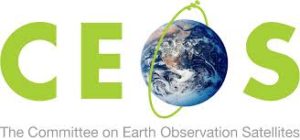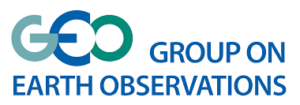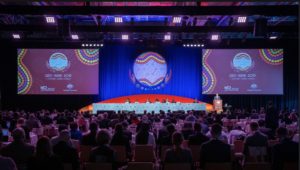International Engagement
The CSIRO Centre for Earth Observation (CCEO) maintains an active presence and leadership role on key international earth observation coordination bodies on behalf of CSIRO and Australia.
With other EO government Agencies CSIRO, Geoscience Australia (GA) and the Bureau of Meteorology (the Bureau), CSIRO leverages its technical expertise and renown experience in specific areas (e.g. calibration and validation) and looks after Australia’s interests in key international fora. In collaboration with the Australian Space Agency (ASA, a Space policy body established in 2018), we aim to increase Australia’s impacts on the international stage, encourage the Australian EO community to join these organisations, support GEO’s objectives (open data policy) generally through advocacy of EO.
Active contributor to global Earth Observation organisations
The Committee on Earth Observation Satellites
The international Committee on Earth Observation Satellites (CEOS) is a multi-Agency organisation involving 60 agencies operating more than 150 satellites. Its core mission is to ensure international coordination of civil space-based EO programs, and advocacy of the free and open exchange of data, to optimise societal benefit and inform decision making for securing a prosperous and sustainable future for humankind.
CEOS is an international body which coordinates a range of space-based EO capabilities and activities, which Members develop, operate and support civil EO satellites.
CEOS’ work spans the development of technical standards for data product exchange, the establishment of high-level inter-agency agreements on common data policies (e.g. information systems enabling data platforms such as the Open Data Cube; calibration and validation; CEOS Analysis Ready Data, ARD, standard) in various applications areas (including contributions to global agendas like Global Stocktake, the UN Sustainable Development Goals).
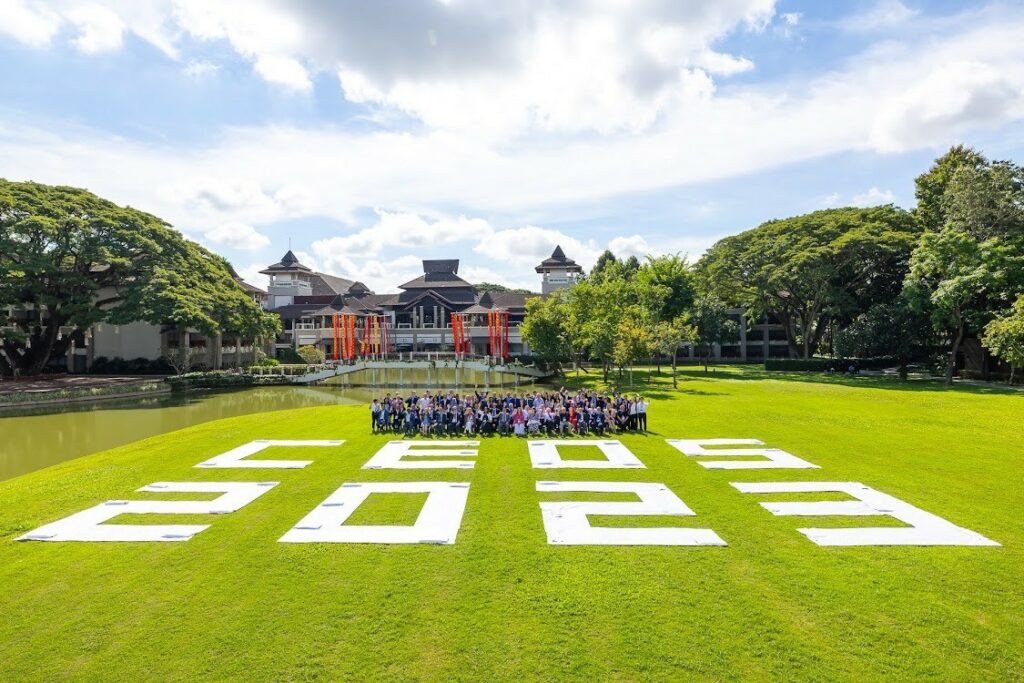
CSIRO, through its CCEO, is an active member of CEOS and leads Australia’s engagement in this forum, which includes the widest global membership of civilian government EO satellite agencies. CSIRO is a leader and/or key contributor to CEOS activities aligned with Australia’s priorities, and contributes to the three major face-to-face meetings:
- Co-lead of the Ecosystem Extent Task Team (including Biodiversity applications)
- SDG Coordination Group: foundational executive member supporting SIT Chair’s strategic direction and the Systems of Engineering Office (SEO) leading its implementation. Its core objective is to assess and coordinate technical support across the organisation for external users of EO satellite data to monitor and achieve SDG 6 (extent of water related ecosystems), SDG 11 (urbanization), SDG 14 (coastal eutrophication), and SDG 15.3.1 in particular (land degradation) which is inherently linked to the GEO Land Degradation Neutrality (LDN) flagship and its UN custodian agency (UNCCD) .
To request a transcript please contact us.
CEOS and the UN Sustainable Development Goals (SDG) video
- Active member following leadership position (2019-2021) of the Working Group on Information Systems and Services (WGISS): data analytics, and all information life cycle from the requirements and metadata definition for the initial ingestion of satellite data into archives through to the incorporation of derived information into end-user applications.
- Active member following leadership position (2018-2020) of the Working Group on Calibration & Validation (WGCV): to ensure long-term confidence in the accuracy and quality of EO data and products and to provide a forum for the exchange of information about calibration and validation, including the coordination of cooperative activities.
- Other activities related to Disasters, COAST (coastal observations & applications)
- SIT (Strategic Implementation Team) in 2020 and 2021, together with Geoscience Australia: SIT is the machinery of CEOS and provides ongoing strategic guidance on the direction, progress, and status of agreed implementation activities in relation to the established priorities, commitments, and partnerships of the CEOS organisation. Despite running our 4 SIT major meetings (see more about our first SIT meeting (originally planned in Hobart), and other SIT-36 and Technical Workshops as per the last one in September 2020) virtually due to the global health crisis, we successfully delivered impacts in our 3 priorities:
- Implementation of a CEOS ARD (Analysis Ready Data) Strategy for space agencies,
- Improved coordination of satellite-based observations of the earth’s carbon & biomass stocks,
- Increased support in CEOS activities linked to the Sustainable Development Goals (SDGs)
- Former CEOS Chair, with the 30th Plenary held in Brisbane (2016)
The Group on Earth Observations
The Group on Earth Observations (GEO) is an intergovernmental organisation working to improve the availability, access and use of EO for the benefit of society. GEO works to actively improve and coordinate global EO systems and promote broad, open data sharing. GEO’s global priorities include supporting the UN 2030 Agenda for Sustainable Development, the Paris Climate Agreement, and the Sendai Framework for Disaster Risk Reduction. GEO consists of 105 member countries and 127 participating organisations.
CSIRO, in addition to support experts contributing to GEO activities, is a member of the Australian government delegation led by Geoscience Australia (GA), a GEO Executive Committee member until 2023. CSIRO’s past and current contributions include:
- Secretariat: CEOS representative at GEO Executive Committee meetings (during SIT Chair term); Programme Board; Expert Advisory Group; Pacific Islands Advisory Group (PIAG – Co-lead)
- Work Plan activities:
- GEO Land Degradation Neutrality Initiative (Co-lead). CSIRO’s leading role has had significant impacts in improving the use of EO data in the SDG process both domestically and internationally.
- GEO EO4SDG Initiative
- Other GEO initatives with CSIRO participation: GEOGLAM (Agriculture- Advisory Group member), GFOI (Forest), Blue Planet (Oceans), AquaWatch (inland and coastal water), GEO BON (Biodiversity)
- Annual attendance at the GEO Plenary to report on activities, organise and participate in side-meetings (SDGs, Open Data Cube, ARD, industry engagement).
-
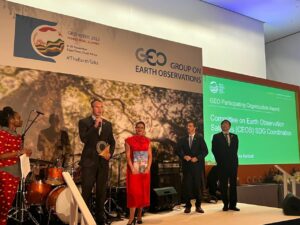
GEO 2023 SDG Award Winners – CSIRO and NASA accepting the CEOS SDG Coordination Group one (Participating Organisation)
In 2023, the GEO Ministerial took place in Cape Town, South Africa: CSIRO joined the Australian delegation that contributed to the adopted Ministerial Declaration as well as the GEO Post-2025 Strategy. In parallel, CSIRO co-organised and contributed to sessions in relation to the LDN Flagship, water quality (AquaWatch and Indigenous engagement), and the SDGs, and supported the CEOS delegation in running the exhibition booth.
- The previous GEO Ministerial Summit (every 4 years) and Plenary was organised in Canberra, 4-9 November 2019. In the Industry Track, the CCEO organised the Earth observation 2.0 workshop with Big Data providers and SMEs to showcase data platforms and how they can meet user needs.
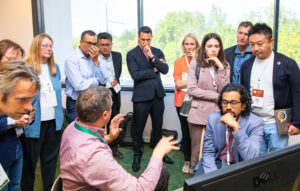
Attendees interacting with the demonstrations from product providers at the EO 2.0 Workshop held during GEO Week 2019
-
GEO Week 2019: the annual GEO Week, and 4-yearly Ministerial Summit, is one of the world’s largest gatherings of EO practitioners and policy makers.
Bilateral and regional partnerships
The Centre manages several bilateral agreements which have been signed (or in discussion) with space agencies around the world, to name just a few:
- European Space Agency (ESA), Europe
- Centre National d’Etudes Spatiales (CNES), France
- Canadian Space Agency (CSA), Canada
- Deutsches Zentrum für Luft- und Raumfahrt (DLR), Germany
- Xerra (formerly Centre for Space Science Technology), New Zealand
- Vietnam National Space Centre (VNSC), and NAWAPI (Water Management), Vietnam
- CONAE, Argentina
- JAXA, Japan
Some agreements cover all EO activities, while others are more specifically related to NovaSAR, other SAR data or technology exchange. The CCEO also hosts international delegations, and contributes to several international workshops, meetings and events. These provide opportunities for side-meetings, signing, reinforcing partnerships, discussing opportunities and forging collaborations. Our geographic focus is on the Asia Pacific region. Past and current initiatives include:
- SAR (Synthetic Aperture Radar) workshop in Suva (Fiji), November 2019
- Earth Observation for Pacific – workshop held in Brisbane, October 2018
- Open Data Cube for Vietnam – regular capability building workshops
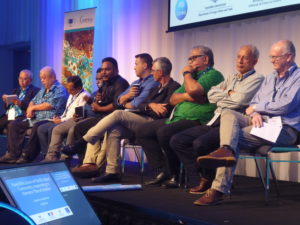
Pacific panel, EO for Pacific Workshop, Brisbane October 2018
Management of Capability and Space Science Applications
Our work in space applications is international in nature, including
- NovaSAR-1, which is a partnership with the UK, India and the Philippines
- Open Data Cube, created by an international partnership with USA (NASA, USGS), UK, and others members of the Committee on Earth Observation Satellites (CEOS) through their Agencies.
Other strategic programs relying on international partnerships
With its freshly launched (March 2023) AquaWatch Australia Mission, a one-million program established with its foundational partner SmartSat CRC and other domestic partners, CSIRO leverages existing partnerships and engages with new international stakeholders to improve its delivery at different levels:
- a diverse Science Advisory Group,
- Establishment of a network of Pilot Sites (+15 across Australia and worldwide),
- General outreach: link with existing initiatives (GEO AquaWatch; European-funded project PrimeWater; International Water Association)
- Cooperation with Space Agencies,
- Construction partners collaboration
Maintaining satellite calibration and validation infrastructure, as well as boosting the development of the CSIRO’s EASI are also heavily dependent on and impact our international collaborations.

